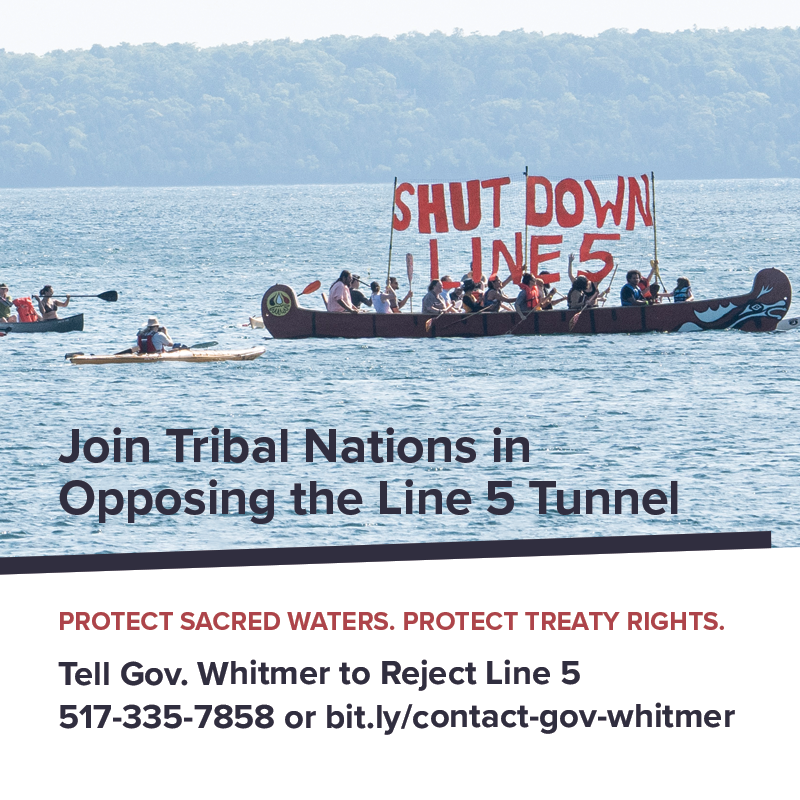Canadian oil giant Enbridge wants to erect enormous (400 foot) cranes flanked by 24/7 lighting and spend the next six years constructing a new tunnel at the pristine Straits of Mackinac. Fish habitats in the area would be ruined, and access to fishing would be limited. The project’s lighting would stretch across the nearby dark sky park. The cranes would be visible from as far away as Mackinac Island. Then, after the pollution, noise, and environmental destruction of the enormous construction project, the local community would be left with a tunnel that brings risks of explosions and leaks to all who rely on the Great Lakes for clean water, recreation, or income.
Every Tribal Nation in Michigan opposes the project and opposition to the project extends beyond the Great Lakes. Our client, Bay Mills Indian Community (BMIC), for whom Michilimackinac (Place of the Great Turtle, also known as the Straits of Mackinac) is a sacred place vociferously opposes the project. Most recently BMIC and five other Tribal Nations withdrew from participating in the U.S. Army Corp of Engineers environmental review due in part to its inadequate consideration of impacts and harms affecting Tribal Nations and Michiganders on the frontline of harm.
Of course, Enbridge requires permits to move forward with this project. Although August 29, 2025, was the deadline to submit public comment on the proposed Line 5 tunnel project to the Michigan Department of Environment, Great Lakes, and Energy (EGLE), you still can voice your concerns about the project and the threat to Michigan’s clean water with Governor Whitmer.
How would this project impact you?
Contact Governor Whitmer at https://somgovweb.state.mi.us/GovRelations/ContactGovernor.aspx or 517-335-7858.
And feel free to publish your comments on social media and tag NARF, Earthjustice, and Bay Mills Indian Community.

Known impacts of the project
- Diminishment of Tribal treaty rights
- The region would see spill risks at every stage from construction to operation. If constructed, the tunnel project would cause permanent loss of wetlands on both sides of the Straits.
- The construction impacts would disrupt and displace bird and wildlife populations on both shores of the Straits. Birders, hikers, as well as cultural and spiritual practitioners along both shores of the Straits would also suffer from these impacts.
- Lake trout and lake whitefish and their spawning grounds subjected to blasting and water quality changes. Tribal and public access to local fishing would be limited during construction.
- Kayakers, paddlers, and other water recreation would be harmed by noise, construction lighting, and equipment such as cranes.
- Construction preparation alone would require 1,100-1,300 truckloads of material impacting local roads and residents. This is about 300 to 400 of truckloads of materials on the north side of the Straits and 800-900 on the south side.
- Tunnel boring and bedrock removal could affect the fundamental geology of the area.
- Drilling fluids and other onshore material storage could release contaminants into the groundwater and soil.
- Any water seepage in the main tunnel could allow gases to separate from the groundwater and mix with the air in the tunnel and create explosion and asphyxiation risk.
- Heavy construction equipment could spill petroleum, oil, and lubricant, and/or coolant.
- Approximately 20,000 gallons of drilling fluid could be released when the water intake pipe emerges from below the lakebed.
- Line 5 is being fast-tracked to respond to an “energy emergency” not shown to exist, yet the project would cost far more fuel to construct than it produces and would take years to complete, making an ineffective solution even if any emergency existed.
- Constructing the tunnel would require around 17,638.3 MWh of energy per year. Operating it would require around 404.1 MWh per year. Transformers and temporary truck mounted power plants would need to be installed, and power poles relocated.
- An estimated 4,588,825 gallons of fuel would be used by commuting construction workers, truck hauling, and construction equipment.
- Enbridge has a history of mishandling Tribal cultural sites during project.
Read more about the project’s impacts at the draft Environmental Impact Statement.
Time is running out to share your feedback
With these impacts in mind, we invite you to submit feedback to Governor Whitmer. The state must uphold its obligations to protect Michiganders and Michigan natural resources. If constructed, the tunnel would keep Indigenous and Great Lakes communities at risk of an oil spill.
More blog posts

